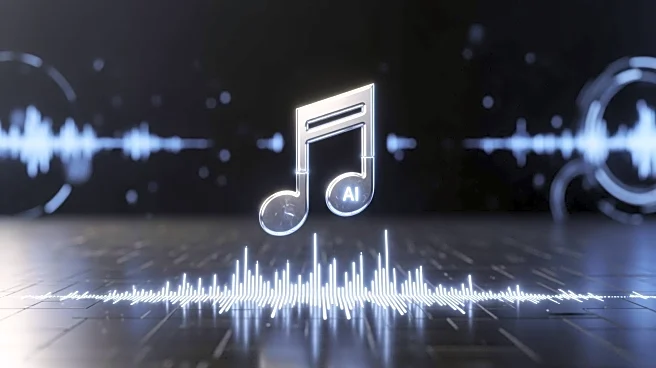What's Happening?
Billboard has reported a significant increase in the presence of AI-generated music on its charts, with at least one AI musician charting weekly. This trend is highlighted by the success of Xania Monet,
an AI project by poet Talisha Jones, whose song 'How Was I Supposed to Know?' debuted at number 30 on the Adult R&B Airplay chart. The rise of AI in music has been marked by the creation of entirely AI-generated bands and the use of AI vocals, leading to a growing number of AI or AI-assisted artists appearing on various Billboard rankings. This development has sparked discussions about the impact of AI on the music industry, as it becomes increasingly challenging to distinguish between human and AI-generated music.
Why It's Important?
The rapid ascent of AI-generated music on the charts signifies a transformative shift in the music industry, raising questions about the future role of human musicians. As AI artists gain popularity, traditional musicians face the risk of being overshadowed, potentially altering the landscape of music creation and consumption. This trend could lead to a reevaluation of artistic value and originality, as AI-generated content becomes more prevalent. The music industry may need to adapt to these changes by developing new frameworks for recognizing and rewarding creativity, while also addressing ethical concerns related to AI's role in artistic expression.
What's Next?
As AI music continues to gain traction, the music industry may see increased investment in AI technology and a surge in AI-generated content. Stakeholders, including record labels and streaming platforms, might explore new business models to capitalize on this trend. Additionally, there could be a push for regulatory measures to ensure fair competition between AI and human artists. The ongoing debate about the implications of AI in music is likely to intensify, prompting discussions about the preservation of human artistry and the ethical use of AI in creative fields.
Beyond the Headlines
The rise of AI in music not only challenges traditional notions of creativity but also raises broader cultural and ethical questions. As AI-generated music becomes more mainstream, society may need to grapple with issues of authenticity and the definition of art. This development could also influence other creative industries, such as film and literature, where AI is increasingly being used to generate content. The long-term impact of AI on cultural production and consumption remains uncertain, but it is clear that it will play a significant role in shaping the future of the arts.











